2024年中考英语语法归纳之零冠词与不定冠词用法归纳
2024中考英语冠词知识点总结_0
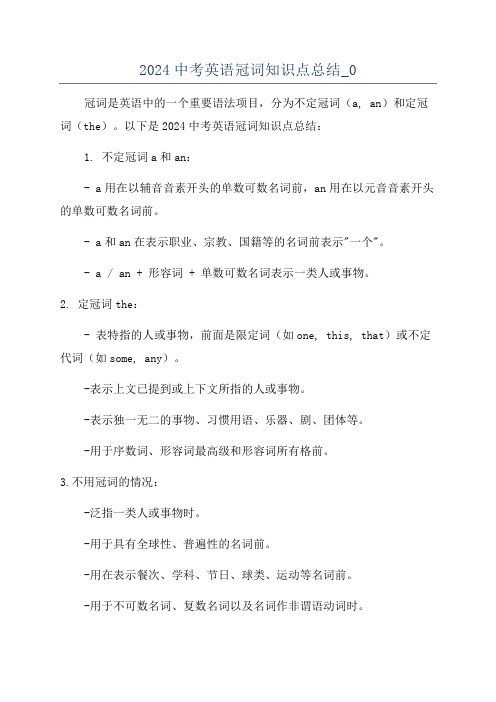
2024中考英语冠词知识点总结_0
冠词是英语中的一个重要语法项目,分为不定冠词(a, an)和定冠词(the)。
以下是2024中考英语冠词知识点总结:
1. 不定冠词a和an:
- a用在以辅音音素开头的单数可数名词前,an用在以元音音素开头的单数可数名词前。
- a和an在表示职业、宗教、国籍等的名词前表示"一个"。
- a / an + 形容词 + 单数可数名词表示一类人或事物。
2. 定冠词the:
- 表特指的人或事物,前面是限定词(如one, this, that)或不定代词(如some, any)。
-表示上文已提到或上下文所指的人或事物。
-表示独一无二的事物、习惯用语、乐器、剧、团体等。
-用于序数词、形容词最高级和形容词所有格前。
3.不用冠词的情况:
-泛指一类人或事物时。
-用于具有全球性、普遍性的名词前。
-用在表示餐次、学科、节日、球类、运动等名词前。
-用于不可数名词、复数名词以及名词作非谓语动词时。
4.冠词用法的特殊情况:
- 表示上面提到的一类人或事物时,用a / an表示"一个"。
- 与不定代词some, any, each, every和numeral连用时,不需要冠词。
- 在固定短语中,如by bus, in bed, at school等,不需要冠词。
总的来说,正确使用冠词需要根据名词的性质、上下文和习惯用法来决定。
掌握冠词的用法能够帮助我们准确表达和理解英语句子的意思。
不定冠词和零冠词的用法总结
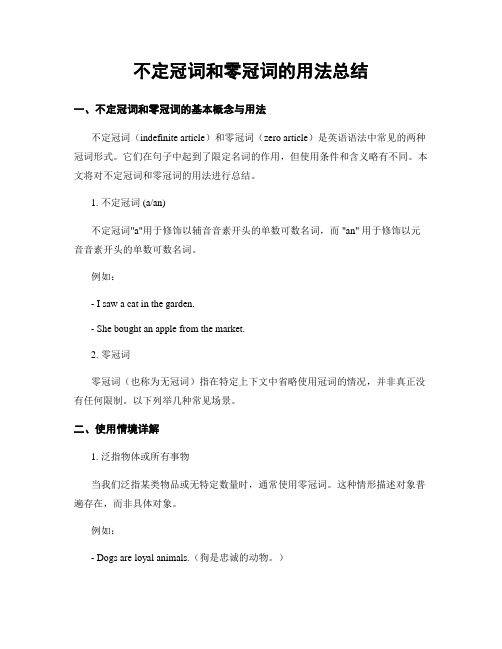
不定冠词和零冠词的用法总结一、不定冠词和零冠词的基本概念与用法不定冠词(indefinite article)和零冠词(zero article)是英语语法中常见的两种冠词形式。
它们在句子中起到了限定名词的作用,但使用条件和含义略有不同。
本文将对不定冠词和零冠词的用法进行总结。
1. 不定冠词 (a/an)不定冠词"a"用于修饰以辅音音素开头的单数可数名词,而 "an" 用于修饰以元音音素开头的单数可数名词。
例如:- I saw a cat in the garden.- She bought an apple from the market.2. 零冠词零冠词(也称为无冠词)指在特定上下文中省略使用冠词的情况,并非真正没有任何限制。
以下列举几种常见场景。
二、使用情境详解1. 泛指物体或所有事物当我们泛指某类物品或无特定数量时,通常使用零冠词。
这种情形描述对象普遍存在,而非具体对象。
例如:- Dogs are loyal animals.(狗是忠诚的动物。
)- Fish swim in water.(鱼在水中游泳。
)2. 用于专业术语和学科名词在特定领域的术语或学科名词中常常使用零冠词。
例如:- Chemistry is a branch of science.(化学是一门科学。
)- He studies biology at university.(他在大学里学习生物学。
)3. 名词前有形容词性物主代词或人称代词当名词前有形容词性物主代词(如my, your, his, her)或人称代词(如I, you, he, she)修饰时,通常省略冠词。
例如:- She lost her keys.(她丢了钥匙。
)- I love my job.(我喜欢我的工作。
)4. 不可数名词和抽象名词不可数名词(uncountable noun)通常不使用不定冠词,除非表示特定的数量或限定。
2024年中考英语专项复习:冠词讲义

冠词冠词分为不定冠词a/an,定冠词the和零冠词。
1.不定冠词的用法a用于辅音音素之前,an用于元音音素之前Eg:It’s raining now.Take an umbrella,please.This is a usual thing.1与单数可数名词连用,表示同类人或物中的任何一个或其中之一,意为“一个,某个”Eg:I want to buy a car.He is an honest boy.2与单数可数名词连用,表示一类人或物,句子译作中文时,不定冠词一般不译出Eg:A teacher must grasp professional knowledge.(老师必须掌握专业知识。
)An student should realize the importance of studying hard.(学生应该意识到刻苦学习的重要性。
)3用在一些集体名词、专有名词以及具体化的抽象名词和物质名词前,意为“一类,一种”等意义Eg:We need an army to protect our country.I never a Eric in my neighborhood.What a pity!She drank a coffee this morning.4与单数可数名词连用,表示数量或单位数量,意为“一,每,一种”Eg:It took me an hour to get to the airport.My mother cleans the house three times a week.It’s a symbol of good luck.5用于序数词前,意为“又一,再一”Eg:They asked for a second chance.I’m so thirsty that I’ve drunk two bottles of water.Now I still want a third one.6用于某些固定词组a bit a few a little in a word have a cold have a fever have aheadachehave a cough to an end take a pride in play a trick on play a role in once upon a time have a rest take a break a great deal2.定冠词的用法1指上文提到的人或事物Eg:There is a pen on your desk.Give the pen to me please.Here are two shirts.The blue one is yours.2表示说话人和听话人都知道的人或事Eg:Your brother is sleeping.Please turn off the TV.He was arrested by the police.3用于序数词和last,first,next,only,same等具有特指意义的形容词之前Eg:She is the first woman who reached the top of Qomolangma.He arrived in Shanghai the next morning.It’s the only secret between us.4用于比较级和最高级前Eg:Which do you think is the more delicious food of the two,hamburger or ice-cream?It’s the most interesting movie I’ve watched.5用在表示方位和方向的名词前Eg:The bookstore is on the west of the museum.You can see a zoo on the left.6用在表示世界上独一无二的自然现象或事物之前Eg:The moon moves around the earth.We have friends all over the world.7用于单数名词或某些形容词之前,表示某一类人、物或抽象概念Eg:The lion is the king of animals.He volunteered to help the sick in the hospital.8用于集体名词、物质名词和专有名词前Eg:The people at present were Lily’s friends.The iron is usually harder than the stone.I visited the Summer Palace two years ago.9用于表示乐器的名词前Eg:Peter can play the violin well.Mary has learned to played the piano for ten years.10“the+姓氏的复数”表示整个家庭Eg:The Smiths are having dinner.11用于某些固定的词组中At the moment at the same time in the end on the left/right all the time in the morning the day after tomorrow the day before yesterday at the foot of around the world in the front of by the end of in the middle of by the way3.零冠词的用法1表示泛指的复数名词前Eg:Most girls work harder than boys.Students are encouraged to read books.2一日三餐、球类、棋、牌等名词前Eg:To keep healthy,we should have breakfast every day.They like playing basketball.Some old men played chess under the tree.3表示节日、季节、月份或星期中7天的名词前Eg:Halloween is in October.It’s very cold in winter.Bill will visit his parents on Sunday.4物质名词、抽象名词、专有名词前物质名词表示泛指时,抽象名词表示一种概念时,表示人名、地名、国家、城市、街道以及大多数湖泊的专业名词前,不用冠词Eg:Drinking coffee is bad for children’s health.Unity is strength.New York is the largest city in America.5表示学科或语言的名词前Eg:What’s this in English?It’s difficult for most girls to learn math well.6两个单数名词连用,表示一个整体,或两个形容词同时修饰一个名词并表示一个人或物时,后面的词不用冠词Eg:He is a teacher and writer.She wanted to buy a knife and fork.Have you seen the black and white cat in my garden?7名词前有某些限定词时Eg:He lost his cellphone.8有些名词加冠词和不加冠词意义不同Eg:at table在吃饭go to school去上学at the table在桌子旁go to the school去学校(可以是上学,也可以指上班)in front of在.....前面(外部)take place(发生)in the front of在.....前面(内部)take the place of(代替)练习:1.-Do you often play_volleyball?-Yes.I want to be____volleyball player.A./;aB.a;theC.the;anD.the;/2.Einstein is___famous inventor who was born in____1870s.A.a;/B.a;theC.the;theD.the;/3.The Blacks have visited_______Great Wall in China.A.theB.anC.aD./4.Many people gave away much money to__poor after the earthquake in Nepal.A.theB.aC.anD./5.This is____old umbrella.I want a new one.A.aB.anC./D.the6.Is there___good restaurant near here?A.aB.anC.theD./7.Frank can play__guitar.What about you?A.aB.anC.theD./8.Jane is___16-year-old high school student in___United States,A.a;theB.the;aC.a;/D./;/9.My son often has__egg and some vegetables for___dinner every day.A.an;/B.an;theC.a;/D.a;the10.-What do you think of football?-It is__exciting sport.A.AB.anC.theD./11.His uncle will give him___birthday present.It'll be wonderful.A.aB.anC.theD./12.-Look!Who is__beautiful girl in red?A.a Oh,she is my deskmate.B.anC.theD./13.-Do you know____boy over there?-Yes,he likes playing___guitar very much.A.the;/B a;the C.a:/ D.the;the14.Grace is good at playing___piano although she is only_____8-yearold girl.A./;theB.the;an a;/ D.the:the15.-Which language do you speak better,______English or______French?A./;/B.the;anC.a;/D.the:the。
冠词不定冠词零冠词的用法
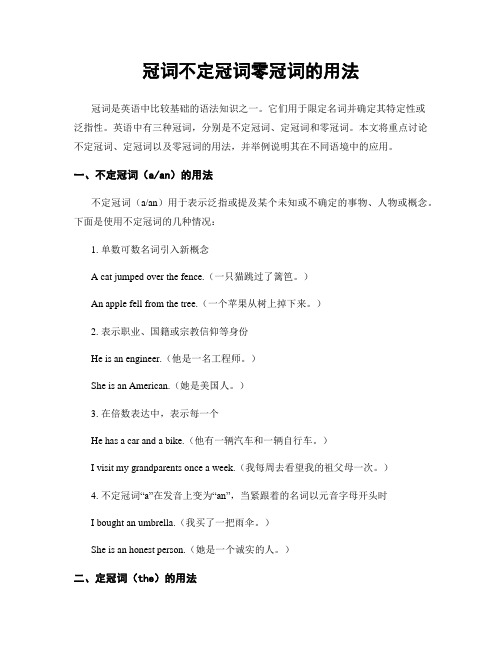
冠词不定冠词零冠词的用法冠词是英语中比较基础的语法知识之一。
它们用于限定名词并确定其特定性或泛指性。
英语中有三种冠词,分别是不定冠词、定冠词和零冠词。
本文将重点讨论不定冠词、定冠词以及零冠词的用法,并举例说明其在不同语境中的应用。
一、不定冠词(a/an)的用法不定冠词(a/an)用于表示泛指或提及某个未知或不确定的事物、人物或概念。
下面是使用不定冠词的几种情况:1. 单数可数名词引入新概念A cat jumped over the fence.(一只猫跳过了篱笆。
)An apple fell from the tree.(一个苹果从树上掉下来。
)2. 表示职业、国籍或宗教信仰等身份He is an engineer.(他是一名工程师。
)She is an American.(她是美国人。
)3. 在倍数表达中,表示每一个He has a car and a bike.(他有一辆汽车和一辆自行车。
)I visit my grandparents once a week.(我每周去看望我的祖父母一次。
)4. 不定冠词“a”在发音上变为“an”,当紧跟着的名词以元音字母开头时I bought an umbrella.(我买了一把雨伞。
)She is an honest person.(她是一个诚实的人。
)二、定冠词(the)的用法定冠词(the)用于指特定或已被提及的事物、人物或概念。
下面是使用定冠词的几种情况:1. 特指已提及过的名词I have a cat. The cat is black and white.(我有一只猫。
这只猫是黑白相间的。
)There is a book on the table. The book belongs to me.(桌子上有一本书。
这本书是我的。
)2. 表示唯一或集合中全部成员The sun rises in the east and sets in the west.(太阳从东方升起,西方落下。
初中英语冠词用法总结归纳

初中英语冠词用法总结归纳1. 不定冠词"a/an":- 用于泛指一个人或物。
例如:I saw a dog in the park.(我在公园里看见了一只狗。
)- 用于表示职业。
例如:She wants to be a teacher.(她想成为一名老师。
)- 用于表示一种身份或身份特征。
例如:He is a student.(他是一名学生。
)- 用于表示频率。
例如:I go to the gym twice a week.(我每周去两次健身房。
)2. 定冠词"the":- 用于特指已知的人或物。
例如:The woman over there is my mother.(那边的女人是我妈妈。
)- 用于表示世界上唯一的事物。
例如:The sun rises in the east and sets in the west.(太阳从东方升起,从西方落下。
)- 用于表示一些类别中的人或物。
例如:The students in our class are all very smart.(我们班的学生都很聪明。
)- 用于表示天体、地理、宗教、报纸和音乐乐器等特定名词。
例如:I love listening to the music on the radio.(我喜欢听收音机里的音乐。
)3.零冠词:- 用于表示特定场所或表示活动的名词。
例如:We went to school.(我们去学校了。
- 用于表示一般化的概念。
例如:Water is essential for life.(水对生命来说是必不可少的。
)- 用于表示语言学科、学位、节日、饮食等专有名词。
例如:I study English.(我学习英语。
)需要注意的是,有些名词可以用不定冠词"a/an"或定冠词"the",具体的用法要根据上下文来判断。
另外,对于可数名词,还要注意单复数形式的冠词用法。
不定冠词和零冠词的用法区别

不定冠词和零冠词的用法区别一、不定冠词的用法不定冠词是英语中最常见的冠词之一,代表的是泛指或未特指的概念。
它可以修饰可数名词单数形式,或者修饰可数名词复数形式,以及某些不可数名词。
1. 用于泛指特定事物不定冠词"a"和"an"通常用于表示一个泛指的概念,当我们提到某个人、物、动物等时,并没有具体指向某一特定对象。
例如,“I saw a dog in the park.”(我在公园看到了一只狗)。
在这个例句中,我们并没有提到具体哪只狗。
2. 用于表示数量不定冠词也可以用于表达数字上的含义。
当我们想要表达“一个”某种东西时,就可以使用"a"或者"an"。
例如,“She has an apple.”(她有一个苹果)。
在这个例句中,我们强调了她只有一个苹果。
3. 用于表示职业当我们讨论某人的职业时,通常会使用不定冠词来修饰这个名词。
例如,“He is an engineer.”(他是一位工程师)。
在这个例句中,我们使用了"an"来修饰工程师。
二、零冠词的用法与不定冠词相比,零冠词(也称为“空格”冠词)在英语中使用的频率较低。
它表示的是特定事物或概念,并且没有使用任何冠词进行修饰。
零冠词通常用于以下情况:1. 用于泛指人和事物当我们讨论一般性的概念或者不特定的事物时,可以使用零冠词。
例如,“Cats are cute animals.”(猫是可爱的动物)。
在这个例句中,我们没有特指某一只猫。
2. 用于表示广义名词有些名词在英语中被视为广义名词,即对整个类别进行泛指。
这些名词通常不需要使用任何冠词。
例如,“I like coffee.”(我喜欢咖啡),在这个例句中,咖啡被视为广义名词。
3. 用于专有名词和复数形式专有名词和复数形式通常也不需要任何冠词进行修饰。
例如,“John plays basketball.”(约翰打篮球)以及“They have cars.”(他们有汽车)。
定冠词、不定冠词、零冠词的用法详解
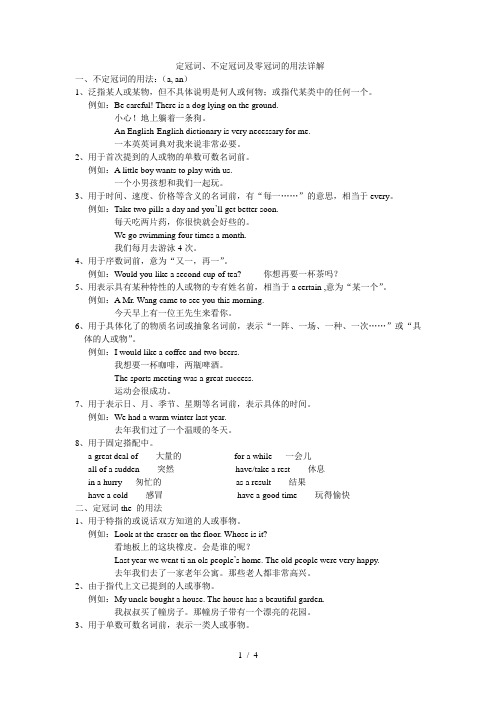
定冠词、不定冠词及零冠词的用法详解一、不定冠词的用法:(a, an)1、泛指某人或某物,但不具体说明是何人或何物;或指代某类中的任何一个。
例如:Be careful! There is a dog lying on the ground.小心!地上躺着一条狗。
An English-English dictionary is very necessary for me.一本英英词典对我来说非常必要。
2、用于首次提到的人或物的单数可数名词前。
例如:A little boy wants to play with us.一个小男孩想和我们一起玩。
3、用于时间、速度、价格等含义的名词前,有“每一……”的意思,相当于every。
例如:Take two pills a day and you’ll get better soon.每天吃两片药,你很快就会好些的。
We go swimming four times a month.我们每月去游泳4次。
4、用于序数词前,意为“又一,再一”。
例如:Would you like a second cup of tea? 你想再要一杯茶吗?5、用表示具有某种特性的人或物的专有姓名前,相当于a certain ,意为“某一个”。
例如:A Mr. Wang came to see you this morning.今天早上有一位王先生来看你。
6、用于具体化了的物质名词或抽象名词前,表示“一阵、一场、一种、一次……”或“具体的人或物”。
例如:I would like a coffee and two beers.我想要一杯咖啡,两瓶啤酒。
The sports meeting was a great success.运动会很成功。
7、用于表示日、月、季节、星期等名词前,表示具体的时间。
例如:We had a warm winter last year.去年我们过了一个温暖的冬天。
定冠词不定冠词零冠词的用法详解
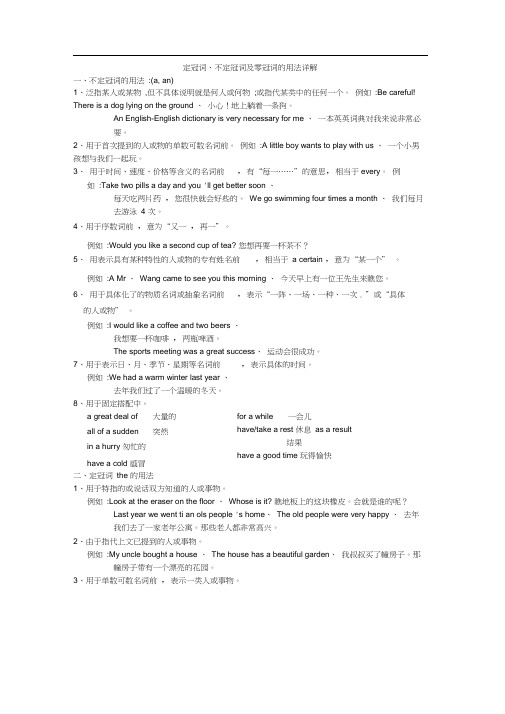
定冠词、不定冠词及零冠词的用法详解一、不定冠词的用法 :(a, an)1、泛指某人或某物 ,但不具体说明就是何人或何物 ;或指代某类中的任何一个。
例如 :Be careful! There is a dog lying on the ground 、 小心!地上躺着一条狗。
An English-English dictionary is very necessary for me 、 一本英英词典对我来说非常必要。
2、用于首次提到的人或物的单数可数名词前。
例如 :A little boy wants to play with us 、 一个小男孩想与我们一起玩。
3、 用于时间、速度、价格等含义的名词前 ,有“每一……”的意思,相当于every 。
例如 :Take two pills a day and you 'll get better soon 、每天吃两片药 ,您很快就会好些的。
We go swimming four times a month 、 我们每月去游泳 4 次。
4、 用于序数词前 ,意为“又一 ,再一”。
例如 :Would you like a second cup of tea? 您想再要一杯茶不?5、 用表示具有某种特性的人或物的专有姓名前 ,相当于 a certain ,意为“某一个” 。
例如 :A Mr 、 Wang came to see you this morning 、 今天早上有一位王先生来瞧您。
6、 用于具体化了的物质名词或抽象名词前,表示“一阵、一场、一种、一次 . ”或“具体 的人或物” 。
例如 :I would like a coffee and two beers 、我想要一杯咖啡 ,两瓶啤酒。
The sports meeting was a great success 、 运动会很成功。
7、 用于表示日、月、季节、星期等名词前例如 :We had a warm winter last year 、去年我们过了一个温暖的冬天。
- 1、下载文档前请自行甄别文档内容的完整性,平台不提供额外的编辑、内容补充、找答案等附加服务。
- 2、"仅部分预览"的文档,不可在线预览部分如存在完整性等问题,可反馈申请退款(可完整预览的文档不适用该条件!)。
- 3、如文档侵犯您的权益,请联系客服反馈,我们会尽快为您处理(人工客服工作时间:9:00-18:30)。
2024年初中英语语法归纳之零冠词与不定冠词用法归纳零冠词的用法1.表示抽象概括意义时,不可数名词和复数名词使用零冠词。
2.专有名词通常使用零冠词。
3.按照习惯下列各类名词使用零冠词:1)季节、月份、星期以及节假日(中国传统节日除外,详细请查阅“定冠词”)等名词前。
2)三餐饭菜的名词。
3)语言、运动、游戏等名词。
4)在某些意义有改变的名词前要使用零冠词。
4.在表示职位、头衔、身份等名词前。
5.泛指的复数名词,表示一类人或事物时,可不用定冠词(泛指的复数名词非零冠词)。
6.当by 与火车等交通工具连用,表示一种方式时,中间无冠词。
7.有些个体名词不用冠词。
8.不用冠词的序数词:a. 序数词前有物主代词b. 序数词作副词:c. 在固定词组中:9.某些中国乐器前面不加冠词,例如:play (/)erhu;play (/)dizi (弹古筝play the zither 吹笛子play the flute)10.有些物质名词和抽象名词前永远用零冠词,即使有形容词,也用零冠词。
11.在表示颜色和语言的名词前用零冠词。
12.特殊动词后用零冠词。
零冠词:是指名词前面没有不定冠词(a、an)、定冠词(the),也没有其他限定词的现象。
零冠词也是冠词的一种。
例如:This is my book.Bread is made from flour.Let's go and play basketball.He is head of the factory.注意:有些名词前用the,或不用the,其意义有所不同。
例如:go to school上学go to the school 到学校去in future 今后,将来in the future 将来零冠词(Zero articles )是指名词前面没有不定冠词( a、an )、定冠词( the ),也没有其他限定词的现象。
零冠词也是冠词的一种。
例如:This is my book.Bread is made from flour.Let's go and play basketball.He is head of the factory.注意:有些名词前用the,或不用the,其意义有所不同。
例如:go to school上学go to the school 到学校去in future 今后,将来in the future 将来零冠词使用口诀及注释:下列情况免冠词,代词限定名词前,专有名词不可数,科球类三餐饭,复数名词表泛指,两季星期月份前,颜色语种和国名,称呼习语和头衔注释:1.下列情况免冠词,代词限定名词前,代词限定词放在名词的前面时,名词不加冠词例:my book; any book2.专有名词不可数,科球类三餐饭,1)不可数名词,专有名词通常不加冠词。
例:Failure is the mother of success.失败乃成功之母2)在三餐、球类运动和娱乐运动的名称前,不加冠词,如have breakfast,play chess。
3.复数名词表泛指,两季星期月份前,例:We go to school from Monday to Friday.我们从星期一到星期五都上课。
4.颜色语种和国名,称呼习语和头衔1)颜色语种和国名如in black; in English; in Canada2)在称呼或表示官衔,职位的名词前不加冠词。
例:The guards took the American to General Lee. 士兵们把这个美国人送到李将军那里。
习惯用零冠词的固定短语:一、介词+零冠词+名词at presentbeyond hope ofby chanceby dayby handby ruleface to facefrom beginninghand in handin battlein danger ofin defence ofin factin fearin hopes ofin issuein place ofin spit ofin timeon account ofon businesson earthon crediton footon handout of dateside by sidewith credit二、动词+零冠词+名词cast anchorcatch firechange gearget fungive battlegive waylose heartmake waysend wordset sail三、动词+零冠词+名词+介词catch sight ofdo duty forfind fault withmake use ofset fire totake hold oftake exception totake part intake care of不定冠词用法归纳1. 表示泛指不定冠词表示泛指,既可指同类中的任何一个(与any 同义),也可指同类中的某一个。
2. 表示数量“一”不定冠词可以表示数量“一”,但其数的概念不如one 强烈。
3. 表示“相同的”表示“相同的”,与the same 同义,尤其与介词of 一起使用。
4. 表示“每一个”与every, each, per 同义,尤其用于表示价格、速度、比率等。
5. 表示“某一”与 a certain 同义。
6. 表示“像……似的”与one like 同义。
7. 用于某些习惯用语中不定冠词用于习语的情形很普遍。
不定冠词a,an的用法区别定冠词和不定冠词的区别:一、不定冠词表示泛指,定冠词表示特指。
不定冠词a (an)与数词one 同源,是"一个"的意思。
a用于辅音音素前,一般读作[e],而an则用于元音音素前,一般读做[en]。
1、表示"一个",意为one;指某人或某物,意为a certain。
如:A Mr. Ling is waiting for you.2、代表一类人或物如:A knife is a tool for cutting with.Mr. Smith is an engineer.二、定冠词the与指示代词this,that同源,有"那(这)个"的意思,但较弱,可以和一个名词连用,来表示某个或某些特定的人或东西。
定冠词的用法:1、特指双方都明白的人或物:Take the medicine. 把药吃了。
2、上文提到过的人或事:He bought a house. I've been to the house. 他买了幢房子。
我去过那幢房子。
3、指世上独一物二的事物:the sun,the sky,the moon,the earth4、单数名词连用表示一类事物,如:the dollar 美元; the fox 狐狸;或与形容词或分词连用,表示一类人:the rich 富人; the living 生者。
5、用在序数词和形容词最高级,及形容词only,very,same等前面:Where do you live? I live on the second floor. 你住在哪?我住在二层。
That's the very thing I've been looking for. 那正是我要找的东西。
6、与复数名词连用,指整个群体:They are the teachers of this school.指全体教师)They are teachers of this school. (指部分教师)7、表示所有,相当于物主代词,用在表示身体部位的名词前:She caught me by the arm.. 她抓住了我的手臂。
8、用在某些由普通名词构成的国家名称、机关团体、阶级、等专有名词前:the People's Republic of China 中华人民共和国the United States 美国9、用在表示乐器的名词之前:She plays the piano. 她会弹钢琴。
10、用在姓氏的复数名词之前,表示一家人:the Greens 格林一家人(或格林夫妇)11、用在惯用语中:in the day, in the morning (afternoon,evening), the day after tomorrowthe day before yesterday, the next morning,in the sky (water,field,country)in the dark, in the rain, in the distance,in the middle (of), in the end,on the whole, by the way, go to the theatre不定冠词:定冠词,英语虚词冠词的一种,冠词是虚词,本身不能单独使用,也没有词义,它用在名词的前面,帮助指明名词的含义。
英语中的冠词有三种,一种是定冠词,另一种是不定冠词,还有一种是零冠词。
不定冠词a(an)与数词one同源,是"一个"的意思。
a用于辅音音素前,一般读作e,而an则用于元音音素前,一般读做en。
不定冠词主要用在可数名词单数前,表示:1.“一个”She is a friend of mine.她是我的一位朋友。
可用在表示数量的词组中:four times a day, half a kilo2. “某一个”Acar is waiting at the gate.有一辆车在门口等你。
3. 某类人或物(可用在表语、同位语中):She is a Canadian (dancer.)她是加拿大人(舞蹈演员)。
4. 某类人或物(可作主语,表示整个这类人或东西):A child needs love.孩子需要爱。
冠词口诀:冠词分为定冠、不定冠,不定冠词a和an,“—”的含义表泛指表示特指要用the,次序、方位、最高级世上物体独一个,人或事物再次提以下情况冠词免,学科球类三顿饭名词复数表泛指,季节星期月份前不定冠词位置:不定冠词常位于名词或名词修饰语前。
注意:a. 位于下列形容词之后:such,what,many,half,I have never seen such an animal.Many a man is fit for the job.b. 当名词前的形容词被副词as, so, too, how, however, enough修饰时,不定冠词应放在形容词之后:It is as pleasant a day as I have ever spent.So short a time.Too long a distance.c. quite,rather与单数名词连用,冠词放在其后。
